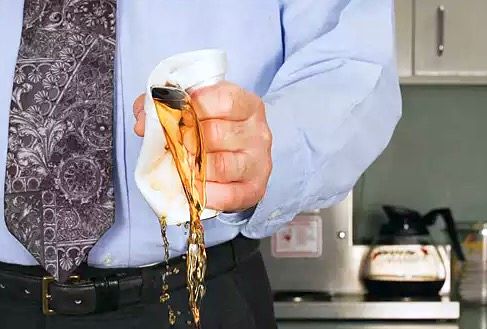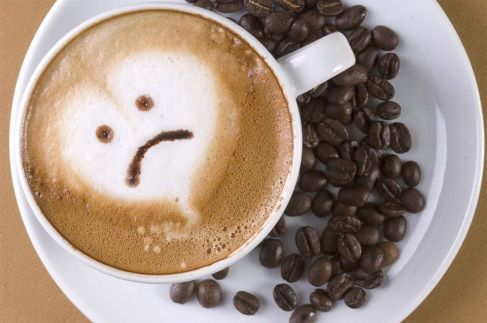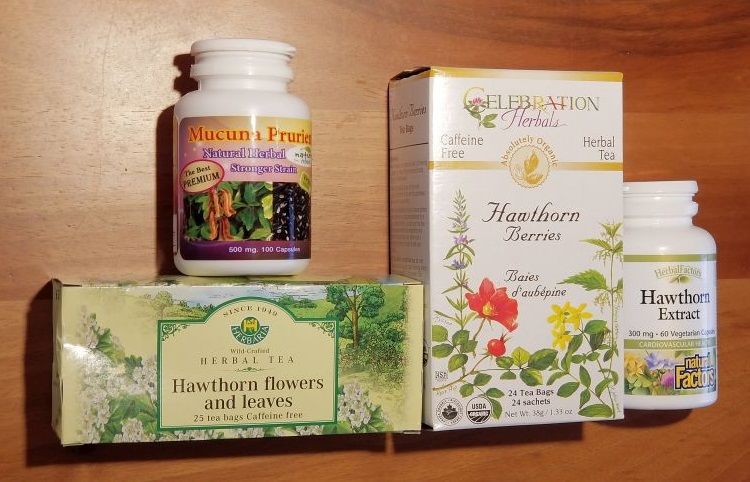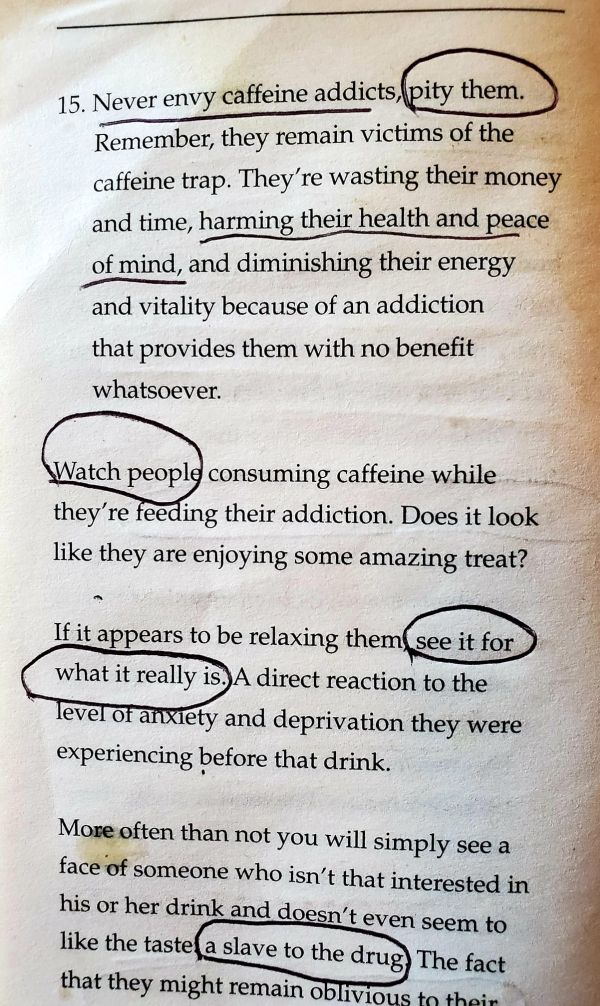It increases anxiety and stress by blocking the neurotransmitter that relieves anxious thoughts
My wife said that I have never been as calm as I am now in all the 29 years that she knows me. Another interesting observation: now I can start working immediately after waking up!

• • • My diary of getting rid of caffeine addiction • • •
Among other things, it describes the mechanism of caffeine influence and withdrawal symptoms in simple terms.
The diary is only of interest to those who suffer from psychological problems. Of course, they may have another underlying cause (e.g. ADHD). But perhaps the caffeine is making these problems worse. After removing caffeine, fatigue and sleepiness were significantly reduced. If you suffer from them, read this first!
• Oct 10, 2020:
The first day without caffeine. I completely removed not only coffee, but also teas (I mean real teas with caffeine), and 100% dark chocolate (which sometimes I indulged myself with because it does not contain sugar or sweetener). Containers of freshly roasted coffee beans, an espresso machine, a coffee grinder and a roaster, as well as oolong and pu-erh tea, are crying and asking: "What's going to happen to us now?" :-(. Okay, stop writing, I'll go get some sleep.
• Oct 24, 2020:
2 weeks have passed. My post in the Quitting Caffeine FB group:
Hi everybody! 2 weeks with no caffeine. I read the advice to quit step by step, by gradual decreasing the dose, but I decided to remove caffeine "in one stroke" - the same was as I removed fast carbs (sugar, bread etc.) 3 years ago.
Got rid of general anxiety almost completely (got rid of it partially earlier, when started taking zinc). The first 3 days were hard (especially the 1st). It was a long weekend in Canada, so I decided to try. On the 4th day I had to work (I am a software developer). My plan was to drink coffee if it would be impossible to work. Even though my head was heavy (it's a bit heavy even now, after 2 weeks), I paid attention that my focus and concentration were very sharp! A few days after that, I sold my very expensive (2.5K USD) Italian espresso machine with no regret - after 3 years of that loved crazy hobby. My daily caffeine doze was 2-3 double espressos, rarely - a 500 ml cup of drip coffee, and two 500 ml cups of tea (pu'er and oolong) - more than enough to develop the dependency.
I have a severe form of obstructive sleep apnea and sleep with the anti-apnea device (CPAP). The pressure, generated by the compressor, is logged in a memory card, so I can analyze how each night was. It's interesting - during these 2 weeks, the pressure achieved much higher numbers than previously (for those who understands: it went up to 18 and more many times, while previously it rarely touched 13-14). In fact, that is a very good news for me! If my apnea is more severe now, that means, my sleep is deeper (the deeper the sleep, the more relaxed the air-blocking tissues are). In other words, previously I had worse rest since my sleep was more shallow. In the morning, I had to compensate that with caffeine which, in turn, caused shallow sleep next night. So, in the morning, I had to compensate that with caffeine.......
Caffeine is classified as one of the most addictive drugs.

• Oct 31, 2020:
3 weeks so far, the flight is going well. This is really a new life - in a state of some kind of euphoria. Sometimes I feel like I'm floating in the air! My wife said that I have never been as calm as I am now in all the 29 years that she knows me. Another interesting observation: now I can start working immediately after waking up. I wake up, run to the washroom, brush my teeth, douse my face with cold water, turn on the computer and dive into work, with fresh mind - my head works "like new"! Previously, such a scenario was absolutely unrealistic - it was necessary to be in the state of transition from sleep for a while, energizing myself with coffee - even though for many months I have been waking up myself, without an alarm clock, and usually very early. I get a good night's sleep thanks to CPAP therapy. Sometimes I still feel a little heaviness in my head, but the game is worth the candle - I will never return to the fog of caffeine addiction! People say that a complete cure takes many months, so I need to be patient. I got off so easily because my coffee addiction wasn't too colossal (but existed for sure judging by the incredible changes in well-being). It was average, I would say.
After removing the caffeine, I started to have a slight ache in my eyes, and they are constantly wet. Probably, this is one of the symptoms of "withdrawal" (I used to occasionally have this if I was very tired and terribly wanted to sleep, but now I don't feel sleepy, which introduces some kind of cognitive dissonance). Firstly I used the moisturizing drops - they helped, but not much. Then an optometrist prescribed other drops. I will see if they help.
By the way, today I woke up in the middle of the night from very high pressure in my CPAP. In the morning I analyzed the data - there were the strongest RERA events, the pressure reached 19.5 - this is a record for all 3.5 years of my CPAP therapy (in general, 20 is the maximum pressure that the device is capable of delivering). This means that I began to sink into an even deeper sleep. No wonder that now, from the very morning, I am immediately ready for work.
• Nov 20, 2020:
Today it's one month of my decaf life. And although the heaviness in the head has not yet gone, the brain is working fine. This is a very strange contradiction - before, a heavy head was synonymous with fatigue and drowsiness, but now it is not: I seem to feel pressure in the skull (which became a headache several times), but at the same time I work with ease, enjoying clear mind and a sharp focus on solving programming problems. Often during work (and not only) I feel that the muscles of the face are completely relaxed - apparently, they were previously unconsciously tense. The average pressure in CPAP increased: if over the past year it was 9.81, then over the last month - 10.78, and over the last week - 12.01. As I mentioned earlier, the increase in apnea suggests that the brain is now resting in a deeper sleep phase. Dreams became a little more emotional (although the change is not as dramatic as it was at the beginning of CPAP therapy, because during apnea the brain did not go into deep sleep at all). The recently sold espresso machine has not yet dreamed of. :-D
Among the side effects of removing caffeine: I now start feeling physical hunger earlier in the day. It's a well-known fact that caffeine dulls hunger. Previously, my first meal was at 11-12 o'clock, now it is often at 10 o'clock. Of course, I could hold out until 11 o'clock (drinking helps with this), but there is no particular sense in making efforts - my eating window is still 6 - 6.5 hours, it just moved a little towards the morning. After completing the second meal at 4 - 4:30, I can easily make it to the evening even if I go to bed late (here the removal of caffeine did not affect). In short, I do not recommend removing caffeine for those who have just started practicing intermittent fasting (or are about to start). However, if you have experience in it, I highly recommend it!
• Dec 10, 2020:
Two months are behind.
New eye drops helped, the pain in my eyes is almost gone, but I often feel them wet. Is my body crying for caffeine? :-)
Meteosensitivity has increased. A couple of times I had a headache when the weather changed, which was not observed before (before there was only a feeling of drowsiness - alas, it was even now, and even stronger). However, the pills (I take Advil and Tylenol at once) relieve headaches quite effectively. I realize that this can be removed with a cup of caffeinated tea, but I am in no hurry to do it - I do not want a return of general anxiety, which almost completely disappeared after the caffeine was removed. Now everything is different: the physical sensation of euphoria, which I wrote about at the beginning, also means the absence of general anxiety - I don't even know how to describe it in words, you need to feel it... In short, instead of the obsessive thought that not everything is good and something bad may happen, now I live immersed in the thought that everything is not so bad, and maybe even great! It appears that not only a lack of zinc, but also caffeine interfered with neurotransmitters. Now they are running around like crazy, with joy and ease (jumping, I suppose), transferring signals from neuron to neuron! :-)

It turns out that withdrawal symptoms (mainly a feeling of heaviness in the head) continue, and it is not clear when they will disappear. If I see that it's forever, then maybe, for the sake of experiment, I will return one cup of tea in the morning, and see if it enhances general anxiety (no doubt, I will feel it right away!). Many articles say that one or two cups of tea or coffee a day will not hurt and will not lead to caffeine addiction, but so far I strictly adhere to the ban on caffeine - it's too early to give up, the show must go on.
I was asked what I drink once coffee and tea with caffeine are excluded. Copying the answer here:
"Ashwagandha, rhodiola, ivan tea, milk thistle, tulsi, dandelion root (fried and not fried; fried a bit like coffee). In the evening (because they can get sleepy): lavender, valerian, pasiflora (the last two - rarely)."
• Dec 25, 2020:
I conducted an experiment - did not take zinc for two weeks (why zinc? Read here). The idea was this: maybe zinc is no longer needed. Did it just "repair" the damage done by caffeine? Alas, I was wrong - caffeine did one harm, and zinc deficiency another. Ten days later, I began to notice that my neurotransmitters began banging their fists on the table and demanding zinc - mild symptoms of the anxiety disorder began to return, as well as an acute reaction to people's actions in the form of a mixture of irritation, anger and resentment. I was living for several days with these symptoms out of interest - will everything return to the old level, or just removing the caffeine will somehow improve the situation? And so it turned out - it improved it. The situation did not return to the previous level, but only slightly worsened. In short, it is better to fire these two cannons at the same time, in order to be sure on the spot, so that from today on, I resumed taking zinc.
• Dec 29, 2020:
On the second day after the return of zinc intake, I physically felt the difference (for the better, of course), and on the fourth day I completely returned to the calm state that was before this small experiment. The answer has been received.
• Jan 10, 2020:
It's been 3 months without caffeine. Although withdrawal symptoms have not disappeared, the situation is gradually improving. The "hoop", squeezing my head, is pressing less. The cutting pain and moisture in the eyes have disappeared almost completely (just a little remained - I'm not complaining at all!). Sleepiness happens, but it also happened "with coffee" (it's just that now I write it off for withdrawal, and not on the fact that I drank not enough coffee, as before). I have headaches, but not severe enough to take a pill. Somebody in the Quitting Caffeine group said that withdrawal symptoms can last a year and a half (ha-ha, it's good that I didn't know when I decided to quit - I was counting on a couple of weeks or a month!). So the situation is not too bad for three months. In any case, there is definitely no reverse - I show my middle finger to general anxiety!
A short explanation of caffeine addiction and withdrawal (in simple terms)
Adenosine is a mediator of intercellular signaling in many tissues. In short, adenosine is a fatigue molecule. In the brain, it accumulates during the waking period, and as its density increases, it "informs" the neurons (brain cells) that it's time to sleep.
Adenosine receptors signal the cell to rest. Neurons - that it's time to sleep. Heart cells - that it is time to reduce activity and pump blood not so vigorously, otherwise the owner will get a heart attack. And also - that it is time to grow new vessels to supply tissue with oxygen, reduce inflammation... In a word, they regulate a lot of processes.
The most famous natural antagonists of these receptors are caffeine (the main active ingredient in coffee) and theophylline (found in tea). They block adenosine receptors, and therefore the brain cells do not feel the accumulated adenosine, and the person does not want to sleep.
Be sure to watch the following short video - it schematically shows how caffeine blocks the receptors. The body is objectively tired and there is a physiological need to restore through sleep, but subjectively we do not feel this! As if a person has lost the ability to feel pain and pick up a red-hot object. The cartoon shows how the brain reacts to the fact that the receptors for adenosine are blocked by caffeine - by creating more and more receptors, which gradually leads to an increase in the need for coffee to achieve the same effect (to continue to block the newly created receptors). The film shows how caffeine blocks not only adenosine, but also dopamine - this leads to anxiety, depression and other psychological disorders (which is why I decided to ban caffeine):
Now imagine the situation: too many receptors have been created, all of them (or most) are blocked by caffeine, and suddenly this same caffeine stops to come! Adenosine molecules happily jump into the adenosine receptors (which, as you understand, leads to drowsiness), but since there are more receptors now, their total effect (i.e. caused drowsiness) is much stronger than it was before the person became coffee addict. The process of withdrawal from caffeine is nothing more than a decrease in the number of adenosine receptors to the initial level.
By the way, in the light of all this, it becomes clear advice to reduce the dose of caffeine gradually - then the number of receptors will decrease slowly, without severe withdrawal symptoms.
• Jan 30, 2020:
I thought the next entry in my caffeine addiction deliverance diary would start with the words "4 months without caffeine", but I didn't guess - I am writing earlier since I have something to say. Apparently, this diary is coming to an end. Not because I became too lazy, but because it (deliverance) has already happened, moreover, suddenly and faster than I expected (I thought it was necessary to wait a year or a year and a half), and rather abruptly, in a few days. And most importantly, purely by accident: I started taking a supplement called Mucuna Pruriens - without any connection with caffeine, but because I liked the description:
"Mucuna Pruriens enhances the natural secretion of testosterone while simultaneously increasing the production of Human Growth Hormone, which helps to build muscle mass and reduce adipose tissue. The synergistic action of both hormones guarantees accelerated muscle growth and also breaks down excess body fat. Mucuna Pruriens is used to treat depression, nervous disorders, improve mental alertness"
"Mucuna contains a complex of substances that have a beneficial effect on the body, support immunity, increase energy and stress resistance, and activate the brain. The plant's most valuable active substances play a key role in the production of adrenaline, norepinephrine and dopamine. It is on these neurotransmitters that our psycho-emotional state depends, as well as all the cognitive processes of the brain, including thinking, memory, concentration and mood. Since the plant increases the production of dopamine in the body, it is considered to be an effective plant for treating depression, mood swings, problems with memory and concentration, and chronic fatigue."
A good article: The Natural Supplement That Replaced My Adderall
I bought mucuna on the Internet, started taking it 2 times a day after meals, and a few days later I was surprised to find that the "hoop", squeezing my head, was gone! I can't say that there is no light sleepiness at all, but I felt it before (when I drank coffee) too, so returning to the previous level is a dream come true. If someday even these little things disappear, this diary will continue.
By the way, I have got rid of meteosensitivity. I read that hawthorn helps - and so it happened. I bought it in the form of tea (one of the flowers and leaves, the second of the crushed berries) and in the form of tablets (extract). The berries tea is not very tasty, so I mix both the teas, it comes out well. As I wrote earlier, after jumping off caffeine, the meteosensitivity clearly increased. However, after the beginning of the consumption of hawthorn, it was already several times that the air temperature rose sharply and the weather was windy, but the headache and drowsiness (which were expected) either did not occur at all, or felt in a form that was clearly lighter than before. Moreover, my wife, who also sometimes consumes hawthorn, reported the same effect. We drink hawthorn very irregularly and rarely, but we try to do it if weather forecasters report an upcoming temperature rise.

• Apr 10, 2020:
Oh, I almost missed a significant date - today is half a year to my life without caffeine! I have even forgotten that I once started a campaign to wean myself from this drug. Perhaps this forgetting is the measure of success?
• • • The end of my diary of getting rid of caffeine addiction • • •
After my symptoms of caffeine withdrawal were gone, I found some very useful advice in the Quitting Caffeine FB group. Copying it here to make life easier for those who also decide to get rid of caffeine addiction:
Magnesium citrate is absolutely incredible. It has eliminated all brain fog for me, given me energy, and cut anxiety down to zero. Benefits showed up on the fourth day.
And now, just a few quotes from the Quitting Caffeine group:
"Not needing it [caffeine] to have energy. I wake up ready like a recharged battery"
"I am less distracted and can focus and learn more deeply"
"I'm not a psycho. No mood swings, less anxiety, no surges in energy, not overly chatty. On a different note I was able to lose weight and fewer pms symptoms"
"if i had to pick one thing as my favorite, it would be the contentedness i feel with being able to sit quietly without my mind racing. I can just sit and do nothing and be happy. This was impossible while on caffeine"
"I am getting to know the real me. Calmer and more measured"
"Feel so much calmer"
"Less anxiety and better sleep"
"I noticed that off caffeine I'm actually less quick to anger"
"Definitely less irritable"
"Same. Things that used to set me off make me laugh now. I also used to startle super easily, now I don't"
"Yes, caffeine has a tendency to make one more feisty, aggressive and emotional as well"
"Same here! Much cooler"
"I was on a sugar and caffeine binge for years and I was a pile of nerves, always stressed at work, even by the small stuff, and when I've quit caffeine and afterwards processed sugar, I've passed the withdrawal period and now I feel totally awesome, calm and cool all the time."
For years I had believed that caffeine helped me to feel more focused and relaxed. Little did I know, I only felt better after a cup of coffee because I was temporarily stalling my own caffeine withdrawal symptoms. After kicking caffeine to the curb a few years ago (and after some BRUTAL withdrawals), my energy levels are higher than they've ever been, with my anxiety levels lower than ever before:
This following guy suggests do decrease the coffee amount in half-cup a week. Very good (and absolutely doable!) approach for the coffee addicts who want to quit caffeine with no heroism:

